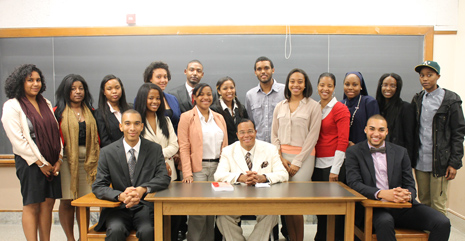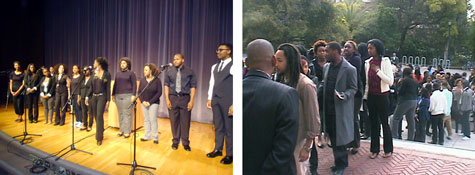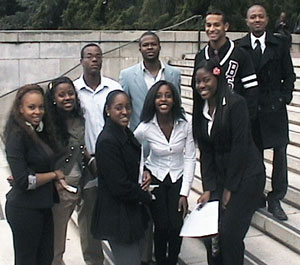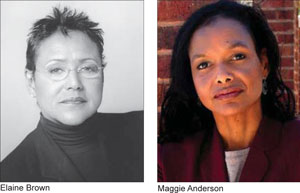Students chart plans for action at UC-Berkeley conference
By Charlene Muhammad -National Correspondent- | Last updated: Mar 27, 2012 - 1:15:41 PMWhat's your opinion on this article?

Minister Farrakhan met with the executive organizing committee for the Afrikan Black Coalition’s 2012 conference following his message. Photo: Fikreselam Habebo
|
BERKLEY, Calif. (FinalCall.com) - Black students at California’s universities convened the 9th Annual Afrikan Black Association Conference at the University of California in early March, aiming to re-ignite flames of activism and strides toward freedom and liberation seen in student movements of the 1960s and 1970s era of Black struggle.
The conference, with the theme “Accepting the Torch: Re-igniting the Flame,” featured keynote speakers, including the Honorable Minister Louis Farrakhan; Elaine Brown, former chairman and minister of information for the Black Panther Party; Maggie Anderson, co-founder of The Empowerment Experiment, which promotes Black-on-Black spending.
It also featured entertainers, workshops on interpersonal relationships, self-mastery and development and caucuses that drew on a history of resilience connected to current issues faced in school systems across their state.

Group photo of the ABC Conference’s participants. Photo: Charlene Muhammad
|
“The conference has been excellent and the Minister’s address was phenomenal. Someone told me a couple of minutes ago that they felt like home and I think that’s what we were shooting for with this year’s conference,” said Salih Muhammad, chair of the Black Student Union at the UC Berkley.
Mr. Muhammad said though the road was difficult, the mission is on track. Coordinating the conference was difficult in part because of their decision to bring Min. Farrakhan to the campus as one of many speakers.
According to Keith Muhammad, student minister of Mosque 26B in Oakland, also Salih’s father, the idea to invite Min. Farrakhan stemmed from the Black Student Union seeking a keynote speaker and Min. Keith hearing Min. Farrakhan’s declaration that he had been cut off from college campuses.
But when news broke that Min. Farrakhan would in fact keynote the conference’s Saturday session, members of the Jewish community vowed to protest. Rabbi Adam Naftalin-Kelman, executive director of Berkley Hillel, the campus’ Jewish student center, wrote an editorial in the Daily Californian stating his disappointment.
“Berkley is best known for its battle for free speech. By bringing Farrakhan to speak on this campus we call this essential value into question,” Mr. Naftalin-Kelman wrote.

The conference featured entertainers, workshops on interpersonal relationships, self-mastery and development and caucuses that drew on a history of resilience connected to current issues faced in school systems across the state. (L) Photo: by Ashahed Muhammad (R)Photo: by Jamo Muhammad
|
But the Black Student Union’s editorial in response so well defended free speech that those who fueled the argument could not defeat their words nor the Black Student Union, according to Min. Keith Muhammad.
In his editorial that ran in the same March 9 issue, Salih Muhammad, on behalf of the Black Student Union at UC Berkley, questioned whether students wanted to revert back to a time when “controversial” speakers like Mario Savio of the Free Speech Movement or Malcolm X were prohibited from speaking on the campus.
“Although we attend a campus that espouses the right to freedom of speech stemming from the Free Speech Movement in the 1960’s, it is sad to see that this freedom is offered to some and denied to others,” Salih Muhammad wrote.
The approximately 750-800 students that filled the Wheeler Hall auditorium waited patiently in long lines to go through security scanning checkpoints in lieu of the routine body searches conducted by the Nation of Islam.
The predominantly Black throng of students began arriving around 7:30 a.m. and held as much of their enthusiasm through Min. Farrakhan’s address and a Q&A session with him.

Photo: Jamo Muhammad
|
“Praise be to Allah we’ve made it thus far and the thing about our people, as the Minister expressed is, we have an amazing will and an amazing determination to continue striving,” Salih Muhammad said.
The conference merged the intersection of today’s student movement with the 1960s and 70s when Ms. Brown and her comrades in the Black Panther Party staked their claim in the Black Power Movement, right from the same California Bay Area as the ABC Conference was held.
“The significance of this conference is they have actually acknowledged the necessity for continuing something as to Black people and that there is a struggle to be continued,” Ms. Brown said.

|
Abdul Akbar Muhammad, international representative of Min. Farrakhan and the Nation of Islam, noted Min. Farrakhan hasn’t spoke at UC Berkley since 1964 and it was a struggle to get him there then. The essence of the conference builds on the fact that Black Studies began on the West Coast, in cities like San Jose, for instance. And that movement gave impetus to Black Studies groups all over the U.S., but he added, there’s been a decline.
“These students made a conscious decision, being influenced by strong leadership on the campus that included Bro. Salih. ... They were encouraged, ‘Open the door. Don’t close your mind because a group of people are opposed to Louis Farrakhan,’ ” Min. Akbar Muhammad told The Final Call.
Now youth on not just the 41 historically Black college campuses, but all major universities, have access to Min. Farrakhan’s ABC Conference address to satisfy their curiosity, he added.
Ms. Anderson encouraged the students to make an economic difference when they return to their campus communities by supporting Black businesses.
“Acknowledge that your achievement comes with a debt to your community,” she said, while lamenting that many of the businesses she proudly supported during her family’s two-year buy Black campaign had gone out of business.
“Two years is just too long for Black businesses, so now instead of supporting Blacks businesses and being enlightened and empowered by that, I’m feeling stupid, and tired, and depressed,” Ms. Anderson added.
Tatiana Bush of UC Davis told The Final Call she always enjoys the ABC Conferences for social reasons and the opportunity to see the collection of beautiful Black people in the Diaspora. That’s a rare scene on campus, she said.
“I feel as though we had a lot of tangible action plans this time around, which is we’re getting better at making progress as opposed to just talking about our feelings and the plight of Black people,” Ms. Bush said.
Discussions are nice but at a certain point, change is required, she said.
“It’s inspiring and I’m graduating so I’m happy that they’re doing things after I’m gone,” said the political science, sociology and statistics student.
Ms. Brown said the next step is for the students to unite and move their plan. “They want to do something. They may not be clear about what but they know something has to change and they have to change it. It was a very good conference. I’m very impressed, well organized,” Ms. Brown added.
INSIDE STORIES AND REVIEWS
-
-
About Harriett ... and the Negro Hollywood Road Show
By Rabiah Muhammad, Guest Columnist » Full Story -
Skepticism greets Jay-Z, NFL talk of inspiring change
By Bryan 18X Crawford and Richard B. Muhammad The Final Call Newspaper @TheFinalCall » Full Story -
The painful problem of Black girls and suicide
By Charlene Muhammad -National Correspondent- » Full Story -
Exploitation of Innocence - Report: Perceptions, policies hurting Black girls
By Charlene Muhammad -National Correspondent- » Full Story -
Big Ballin: Big ideas fuel a father’s Big Baller Brand and brash business sense
By Bryan Crawford -Contributing Writer- » Full Story






 Click Here Stay Connected!
Click Here Stay Connected!








